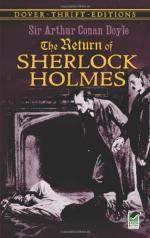“Was any other bicycle missing?”
“No.”
“Is that certain?”
“Quite.”
“Well, now, you do not mean to seriously suggest that this German rode off upon a bicycle in the dead of the night, bearing the boy in his arms?”
“Certainly not.”
“Then what is the theory in your mind?”
“The bicycle may have been a blind. It may have been hidden somewhere, and the pair gone off on foot.”
“Quite so, but it seems rather an absurd blind, does it not? Were there other bicycles in this shed?”
“Several.”
“Would he not have hidden a couple, had he desired to give the idea that they had gone off upon them?”
“I suppose he would.”
“Of course he would. The blind theory won’t do. But the incident is an admirable starting-point for an investigation. After all, a bicycle is not an easy thing to conceal or to destroy. One other question. Did anyone call to see the boy on the day before he disappeared?”
“No.”
“Did he get any letters?”
“Yes, one letter.”
“From whom?”
“From his father.”
“Do you open the boys’ letters?”
“No.”
“How do you know it was from the father?”
“The coat of arms was on the envelope, and it
was addressed in the
Duke’s peculiar stiff hand. Besides, the
Duke remembers having written.”
“When had he a letter before that?”
“Not for several days.”
“Had he ever one from France?”
“No, never.
“You see the point of my questions, of course. Either the boy was carried off by force or he went of his own free will. In the latter case, you would expect that some prompting from outside would be needed to make so young a lad do such a thing. If he has had no visitors, that prompting must have come in letters; hence I try to find out who were his correspondents.”
“I fear I cannot help you much. His only correspondent, so far as I know, was his own father.”
“Who wrote to him on the very day of his disappearance. Were the relations between father and son very friendly?”
“His Grace is never very friendly with anyone. He is completely immersed in large public questions, and is rather inaccessible to all ordinary emotions. But he was always kind to the boy in his own way.”
“But the sympathies of the latter were with the mother?”
“Yes.”
“Did he say so?”
“No.”
“The Duke, then?”
“Good heaven, no!”
“Then how could you know?”
“I have had some confidential talks with Mr. James Wilder, his Graces secretary. It was he who gave me the information about Lord Saltire’s feelings.”
“I see. By the way, that last letter of the Dukes—was it found in the boy’s room after he was gone?”
“No, he had taken it with him. I think, Mr. Holmes, it is time that we were leaving for Euston.”




